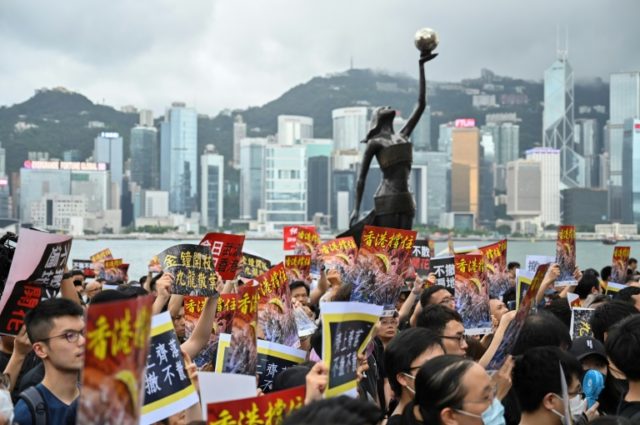Hong Kong (AFP) – As Hong Kong is rocked by political chaos, Chinese mainlander Briony Lin has found herself joining the mass protests, an act that would be unthinkable under the authoritarian regime back home.
The huge rallies and clashes coursing through the international finance hub are the latest outburst of anger by Hong Kongers who believe Beijing is stamping down on the city’s unique freedoms and culture.
But for the hundreds of thousands of Chinese mainlanders who make the city their home, the movement sparks mixed emotions.
Some strongly disagree with the protests, which were set off by a now-suspended plan to allow extraditions to the Chinese mainland.
Many have sympathies with the movement, but keep it to themselves — fearful of retribution by Chinese authorities, or being made to feel unwelcome by local protesters.
A small number of people, like Lin, have taken to the streets.
“This is the first social movement that I’ve experienced,” said the 27-year-old, who moved to Hong Kong four years ago from a city in northern China.
“Hong Kong is the only place in China where freedom of speech can be exercised… I want to be there for my own rights and be there to see for myself what the protests are like,” she told AFP.
Lin said she was happy to give her name and, unlike many, eschewed wearing a mask at the rallies — although she has stayed clear of the more violent confrontations.
– Mainland influx –
Some one million mainlanders have migrated to Hong Kong since its 1997 handover to China, a diaspora that is itself a source of friction in a city of 7.3 million beset by sky-high property prices and a huge housing shortage.
Inside Hong Kong they are afforded the same free speech protections as any other inhabitant, but they risk censure or punishment on return to the mainland should authorities deem them to be critical of Beijing.
Lin said she was indifferent to politics before she moved to the city.
But the disappearance of five Hong Kong booksellers into Chinese mainland custody — and discovering more about the Cultural Revolution on its 50th anniversary — changed that.
“If the (extradition) bill is passed, the disappearance of booksellers would happen again within the law,” she said.
Not all share Lin’s bravado.
In China the protests have been portrayed as a violent, foreign-funded plot, not a mass movement against Beijing’s increased influence over the semi-autonomous hub.
AFP approached some 20 mainland tourists in Kowloon to ask them their thoughts and only six had heard there were rallies.
“It is rare to see protests on the mainland,” said a 21-year-old student surnamed Zhu who said she had read about the protests on the Twitter-like Weibo platform.
Another tourist, who gave her surname as Hao, said she had read in Chinese state media that Britain “participated in and provoked this incident”.
“I don’t know whether it is correct or not,” she added.
Mainlanders who live in Hong Kong cannot profess such ignorance, but many “Hong Kong drifters” — the phrase adopted by young, educated mainlanders who live and work in the finance hub — are still very cautious about expressing political views.
“Protesting is quite sensitive for us… I don’t want to bear any risks,” said Liu, 30, who works in insurance and came to Hong Kong seven years ago.
He said many of his mainland contemporaries hoped the protests would die down soon.
Kay Zeng, 28, from Guangdong province, just across the border with Hong Kong, said she disapproved of the extradition bill being rushed through, but would not take to the streets.
“I’ve never participated in a march and I seldom publicly express my opinions,” she told AFP.
– ‘Right thing to do’ –
But small numbers are adopting the pro-democracy cause.
A group of mainland Chinese migrants openly participated in recent rallies, holding banners and shouting slogans in their own dialects, not the city’s Cantonese language.
Minnie Li, a university lecturer who came from Shanghai to Hong Kong in 2008, helped organise the group.
She said mainland migrants have always attended pro-democracy rallies, but most of the time they kept themselves hidden in the crowd.
Li said it took years for her to pluck up the courage to attend — something she felt more able to do once she acquired a permanent residency card.
“I believe visibility is a power. If you have a secret stance but dare not to tell others about it then you can’t transform that into a power. So I hope to show our power through our presence,” she told AFP.
Some of the more hardline Hong Kong protesters take an openly hostile view towards mainlanders, calling them “locusts” and other insults.
That animosity used to make Li hesitate, but not any more.
“Your emotions, your action and your values aren’t based on where you were born, or your ethnic group,” she said.
“You do something because you think it is the right thing to do.”

COMMENTS
Please let us know if you're having issues with commenting.